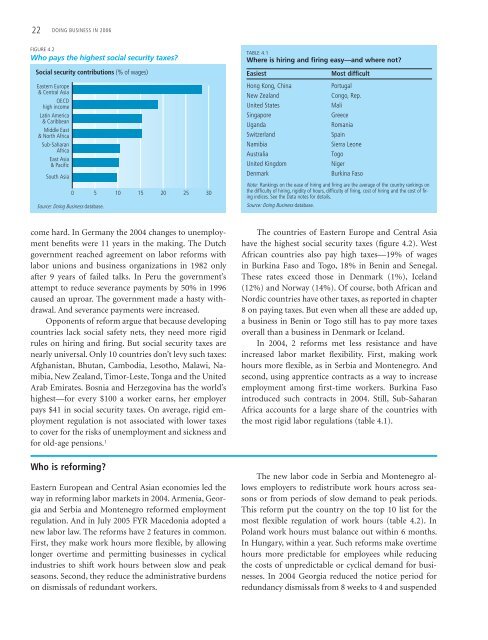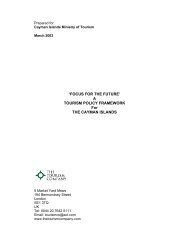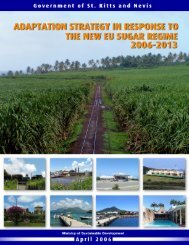Creating
Doing Business in 2006 -- Creating Jobs - Caribbean Elections
Doing Business in 2006 -- Creating Jobs - Caribbean Elections
You also want an ePaper? Increase the reach of your titles
YUMPU automatically turns print PDFs into web optimized ePapers that Google loves.
22 DOING BUSINESS IN 2006<br />
<br />
<br />
TABLE 4.1<br />
Where is hiring and firing easy—and where not?<br />
<br />
Easiest<br />
Most difficult<br />
<br />
<br />
<br />
<br />
<br />
<br />
<br />
<br />
<br />
<br />
<br />
<br />
<br />
<br />
<br />
<br />
Hong Kong, China<br />
New Zealand<br />
United States<br />
Singapore<br />
Uganda<br />
Switzerland<br />
Namibia<br />
Australia<br />
United Kingdom<br />
Denmark<br />
Portugal<br />
Congo, Rep.<br />
Mali<br />
Greece<br />
Romania<br />
Spain<br />
Sierra Leone<br />
Togo<br />
Niger<br />
Burkina Faso<br />
Note: Rankings on the ease of hiring and fi ring are the average of the country rankings on<br />
the diffi culty of hiring, rigidity of hours, diffi culty of fi ring, cost of hiring and the cost of fi r-<br />
ing indices. See the Data notes for details.<br />
Source: Doing Business database.<br />
come hard. In Germany the 2004 changes to unemployment<br />
benefits were 11 years in the making. The Dutch<br />
government reached agreement on labor reforms with<br />
labor unions and business organizations in 1982 only<br />
after 9 years of failed talks. In Peru the government’s<br />
attempt to reduce severance payments by 50% in 1996<br />
caused an uproar. The government made a hasty withdrawal.<br />
And severance payments were increased.<br />
Opponents of reform argue that because developing<br />
countries lack social safety nets, they need more rigid<br />
rules on hiring and firing. But social security taxes are<br />
nearly universal. Only 10 countries don’t levy such taxes:<br />
Afghanistan, Bhutan, Cambodia, Lesotho, Malawi, Namibia,<br />
New Zealand, Timor-Leste, Tonga and the United<br />
Arab Emirates. Bosnia and Herzegovina has the world’s<br />
highest—for every $100 a worker earns, her employer<br />
pays $41 in social security taxes. On average, rigid employment<br />
regulation is not associated with lower taxes<br />
to cover for the risks of unemployment and sickness and<br />
for old-age pensions. 1<br />
The countries of Eastern Europe and Central Asia<br />
have the highest social security taxes (figure 4.2). West<br />
African countries also pay high taxes—19% of wages<br />
in Burkina Faso and Togo, 18% in Benin and Senegal.<br />
These rates exceed those in Denmark (1%), Iceland<br />
(12%) and Norway (14%). Of course, both African and<br />
Nordic countries have other taxes, as reported in chapter<br />
8 on paying taxes. But even when all these are added up,<br />
a business in Benin or Togo still has to pay more taxes<br />
overall than a business in Denmark or Iceland.<br />
In 2004, 2 reforms met less resistance and have<br />
increased labor market flexibility. First, making work<br />
hours more flexible, as in Serbia and Montenegro. And<br />
second, using apprentice contracts as a way to increase<br />
employment among first-time workers. Burkina Faso<br />
introduced such contracts in 2004. Still, Sub-Saharan<br />
Africa accounts for a large share of the countries with<br />
the most rigid labor regulations (table 4.1).<br />
Who is reforming?<br />
Eastern European and Central Asian economies led the<br />
way in reforming labor markets in 2004. Armenia, Georgia<br />
and Serbia and Montenegro reformed employment<br />
regulation. And in July 2005 FYR Macedonia adopted a<br />
new labor law. The reforms have 2 features in common.<br />
First, they make work hours more flexible, by allowing<br />
longer overtime and permitting businesses in cyclical<br />
industries to shift work hours between slow and peak<br />
seasons. Second, they reduce the administrative burdens<br />
on dismissals of redundant workers.<br />
The new labor code in Serbia and Montenegro allows<br />
employers to redistribute work hours across seasons<br />
or from periods of slow demand to peak periods.<br />
This reform put the country on the top 10 list for the<br />
most flexible regulation of work hours (table 4.2). In<br />
Poland work hours must balance out within 6 months.<br />
In Hungary, within a year. Such reforms make overtime<br />
hours more predictable for employees while reducing<br />
the costs of unpredictable or cyclical demand for businesses.<br />
In 2004 Georgia reduced the notice period for<br />
redundancy dismissals from 8 weeks to 4 and suspended

















